药学英语Unit 8 Text A 注释及译文
- 格式:doc
- 大小:68.00 KB
- 文档页数:10
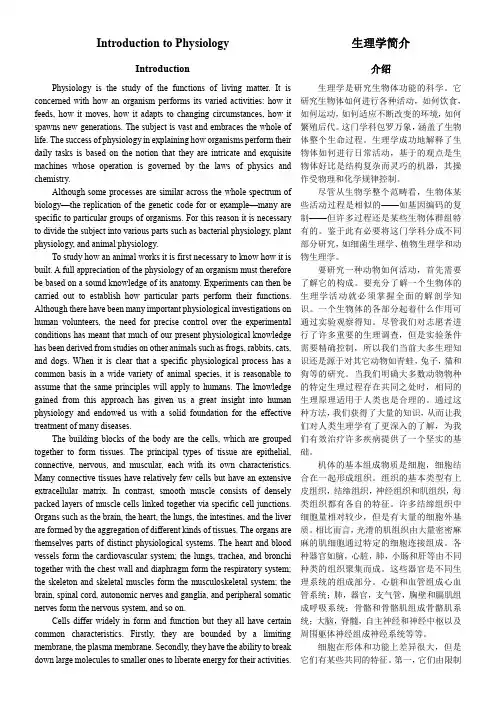
Introduction to PhysiologyIntroductionPhysiology is the study of the functions of living matter. It is concerned with how an organism performs its varied activities: how it feeds, how it moves, how it adapts to changing circumstances, how it spawns new generations. The subject is vast and embraces the whole of life. The success of physiology in explaining how organisms perform their daily tasks is based on the notion that they are intricate and exquisite machines whose operation is governed by the laws of physics and chemistry.Although some processes are similar across the whole spectrum of biology—the replication of the genetic code for or example—many are specific to particular groups of organisms. For this reason it is necessary to divide the subject into various parts such as bacterial physiology, plant physiology, and animal physiology.To study how an animal works it is first necessary to know how it is built. A full appreciation of the physiology of an organism must therefore be based on a sound knowledge of its anatomy. Experiments can then be carried out to establish how particular parts perform their functions. Although there have been many important physiological investigations on human volunteers, the need for precise control over the experimental conditions has meant that much of our present physiological knowledge has been derived from studies on other animals such as frogs, rabbits, cats, and dogs. When it is clear that a specific physiological process has a common basis in a wide variety of animal species, it is reasonable to assume that the same principles will apply to humans. The knowledge gained from this approach has given us a great insight into human physiology and endowed us with a solid foundation for the effective treatment of many diseases.The building blocks of the body are the cells, which are grouped together to form tissues. The principal types of tissue are epithelial, connective, nervous, and muscular, each with its own characteristics. Many connective tissues have relatively few cells but have an extensive extracellular matrix. In contrast, smooth muscle consists of densely packed layers of muscle cells linked together via specific cell junctions. Organs such as the brain, the heart, the lungs, the intestines, and the liver are formed by the aggregation of different kinds of tissues. The organs are themselves parts of distinct physiological systems. The heart and blood vessels form the cardiovascular system; the lungs, trachea, and bronchi together with the chest wall and diaphragm form the respiratory system; the skeleton and skeletal muscles form the musculoskeletal system; the brain, spinal cord, autonomic nerves and ganglia, and peripheral somatic nerves form the nervous system, and so on.Cells differ widely in form and function but they all have certain common characteristics. Firstly, they are bounded by a limiting membrane, the plasma membrane. Secondly, they have the ability to break down large molecules to smaller ones to liberate energy for their activities.生理学简介介绍生理学是研究生物体功能的科学。
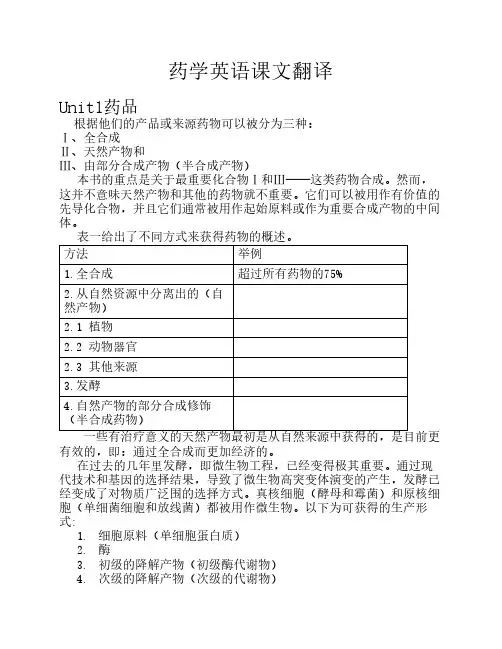
药学英语课文翻译Unit1药品根据他们的产品或来源药物可以被分为三种:Ⅰ、全合成Ⅱ、天然产物和Ⅲ、由部分合成产物(半合成产物)本书的重点是关于最重要化合物Ⅰ和Ⅲ——这类药物合成。
然而,这并不意味天然产物和其他的药物就不重要。
它们可以被用作有价值的先导化合物,并且它们通常被用作起始原料或作为重要合成产物的中间体。
表一给出了不同方式来获得药物的概述。
方法举例1.全合成超过所有药物的75%2.从自然资源中分离出的(自然产物)2.1 植物2.2 动物器官2.3 其他来源3.发酵4.自然产物的部分合成修饰(半合成药物)一些有治疗意义的天然产物最初是从自然来源中获得的,是目前更有效的,即:通过全合成而更加经济的。
在过去的几年里发酵,即微生物工程,已经变得极其重要。
通过现代技术和基因的选择结果,导致了微生物高突变体演变的产生,发酵已经变成了对物质广泛围的选择方式。
真核细胞(酵母和霉菌)和原核细胞(单细菌细胞和放线菌)都被用作微生物。
以下为可获得的生产形式:1. 细胞原料(单细胞蛋白质)2. 酶3. 初级的降解产物(初级酶代谢物)4. 次级的降解产物(次级的代谢物)在次级代谢物中,必先提起的是抗生素,以下五种药代表了每年世界范围内价值170亿美元的药物:青霉素,头孢菌素,四环素,红霉素,氨基糖苷类。
大约有5000种抗生素已经从微生物中分离出来了,但在这些中仅有那些少于100种用于治疗使用。
然而,一定知道,那些衍生物通过部分合成被改进用于治疗。
在过去十年中,单单从β-内酰胺半合成的就有五万种药物。
发酵在容积大于400m3的不锈钠发酵罐中进行,避免了微生物噬菌体的污染等等,整个过程必须在无菌条件下进行。
(倒数第五段开始)大量使用的试剂不仅仅是酸(盐酸、硫酸、硝酸、醋酸),还有无机和有机碱(氢氧化钠、氢氧化钾、碳酸钾、重碳酸钾、铵碱、三乙胺、吡啶)。
还有辅助化学物质包括活性炭和催化剂。
所有这些补充的化学物质(比如中间体)在最终产物中可能是杂志的来源。
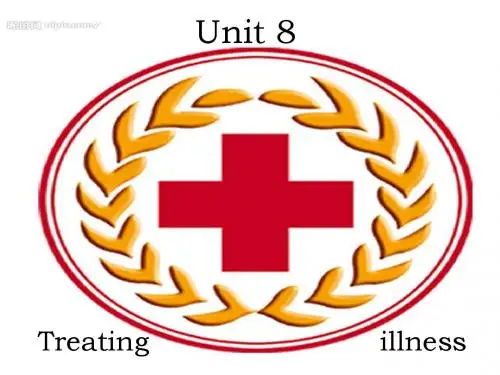
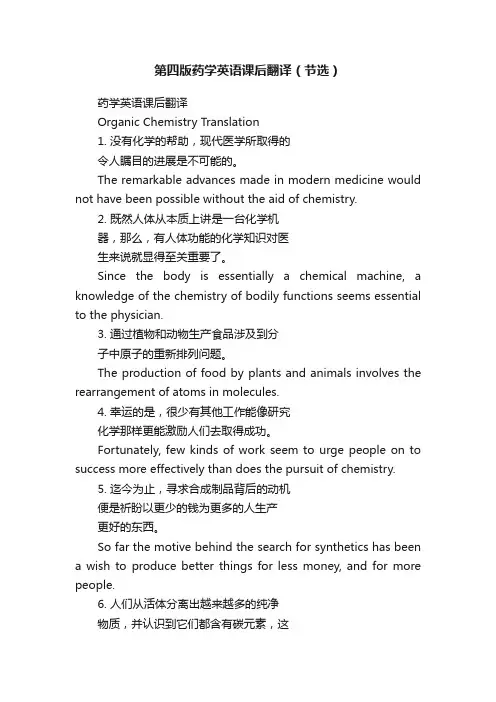
第四版药学英语课后翻译(节选)药学英语课后翻译Organic Chemistry Translation1. 没有化学的帮助,现代医学所取得的令人瞩目的进展是不可能的。
The remarkable advances made in modern medicine would not have been possible without the aid of chemistry.2. 既然人体从本质上讲是一台化学机器,那么,有人体功能的化学知识对医生来说就显得至关重要了。
Since the body is essentially a chemical machine, a knowledge of the chemistry of bodily functions seems essential to the physician.3. 通过植物和动物生产食品涉及到分子中原子的重新排列问题。
The production of food by plants and animals involves the rearrangement of atoms in molecules.4. 幸运的是,很少有其他工作能像研究化学那样更能激励人们去取得成功。
Fortunately, few kinds of work seem to urge people on to success more effectively than does the pursuit of chemistry.5. 迄今为止,寻求合成制品背后的动机便是祈盼以更少的钱为更多的人生产更好的东西。
So far the motive behind the search for synthetics has been a wish to produce better things for less money, and for more people.6. 人们从活体分离出越来越多的纯净物质,并认识到它们都含有碳元素,这样便诞生了有机化学Isolation of increasing numbers of purified materials from living forms and recognition of the fact that all contained carbon gave birth to organic chemistry.7. 煤与氧结合在炉中燃烧,生成二氧化碳——一种在成分和化学性质上都不同于煤和氧的全新物质。
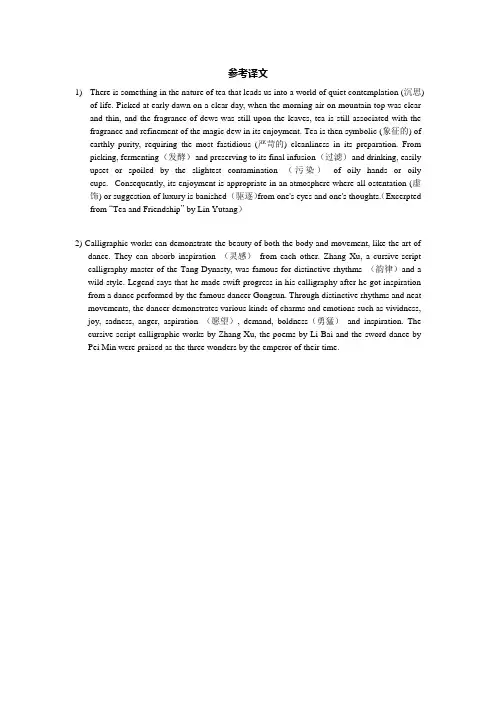
参考译文1)There is something in the nature of tea that leads us into a world of quiet contemplation (沉思)of life. Picked at early dawn on a clear day, when the morning air on mountain top was clear and thin, and the fragrance of dews was still upon the leaves, tea is still associated with the fragrance and refinement of the magic dew in its enjoyment. Tea is then symbolic (象征的) of earthly purity, requiring the most fastidious (严苛的) cleanliness in its preparation. From picking, fermenting (发酵)and preserving to its final infusion (过滤)and drinking, easily upset or spoiled by the slightest contamination (污染)of oily hands or oily cups. Consequently, its enjoyment is appropriate in an atmosphere where all ostentation (虚饰) or suggestion of luxury is banished (驱逐)from one's eyes and one's thoughts.(Excerpted from “Tea and Friendship” by Lin Yutang)2) Calligraphic works can demonstrate the beauty of both the body and movement, like the art ofdance. They can absorb inspiration (灵感)from each other. Zhang Xu, a cursive-script calligraphy master of the Tang Dynasty, was famous for distinctive rhythms (韵律)and a wild style. Legend says that he made swift progress in his calligraphy after he got inspiration from a dance performed by the famous dancer Gongsun. Through distinctive rhythms and neat movements, the dancer demonstrates various kinds of charms and emotions such as vividness, joy, sadness, anger, aspiration (愿望), demand, boldness(勇猛)and inspiration. The cursive-script calligraphic works by Zhang Xu, the poems by Li Bai and the sword dance by Pei Min were praised as the three wonders by the emperor of their time.。
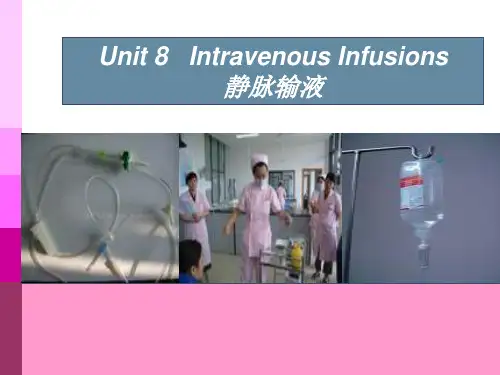
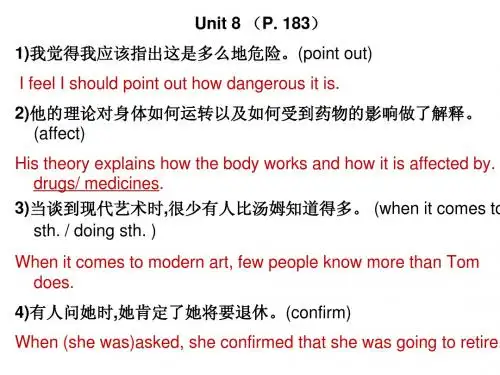
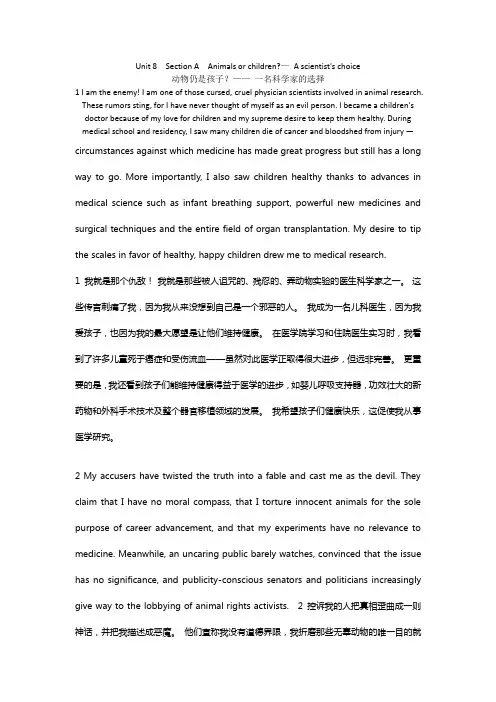
Unit 8 Section A Animals or children?—A scientist's choice动物仍是孩子?——一名科学家的选择1 I am the enemy! I am one of those cursed, cruel physician scientists involved in animal research. These rumors sting, for I have never thought of myself as an evil person. I became a children's doctor because of my love for children and my supreme desire to keep them healthy. During medical school and residency, I saw many children die of cancer and bloodshed from injury —circumstances against which medicine has made great progress but still has a long way to go. More importantly, I also saw children healthy thanks to advances in medical science such as infant breathing support, powerful new medicines and surgical techniques and the entire field of organ transplantation. My desire to tip the scales in favor of healthy, happy children drew me to medical research.1 我就是那个仇敌!我就是那些被人诅咒的、残忍的、弄动物实验的医生科学家之一。
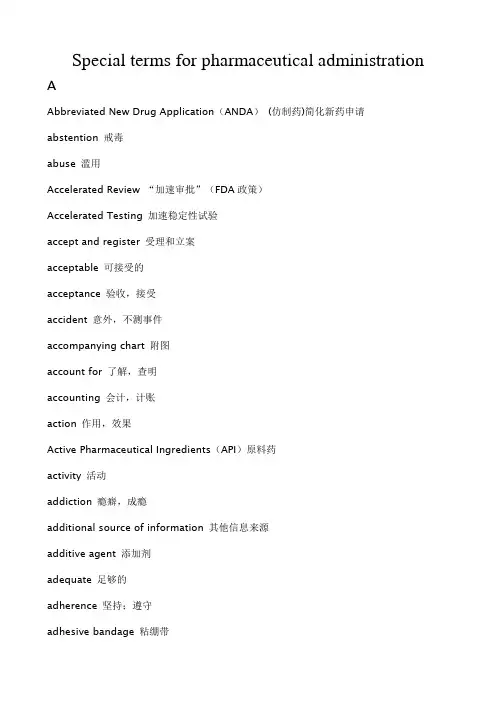
Special terms for pharmaceutical administration AAbbreviated New Drug Application(ANDA)(仿制药)简化新药申请abstention 戒毒abuse 滥用Accelerated Review “加速审批”(FDA政策)Accelerated Testing 加速稳定性试验accept and register 受理和立案acceptable 可接受的acceptance 验收,接受accident 意外,不测事件accompanying chart 附图account for 了解,查明accounting 会计,计账action 作用,效果Active Pharmaceutical Ingredients(API)原料药activity 活动addiction 瘾癖,成瘾additional source of information 其他信息来源additive agent 添加剂adequate 足够的adherence 坚持;遵守adhesive bandage 粘绷带Administrative Law Judge行政法裁判administration responsibility 行政责任administrative 行政的,管理的administrative officers 行政官员Administrative Procedure Act of19046《1946年行政诉讼法》Administrative Procedure Law《行政诉讼法》Administrative Reconsideration Law《行政复议法》Administrative Supervision Law《行政监察法》adopted name 药品通用名adulterate (在饮食和药品中)掺假adulteration(在饮食和药品中)掺假advance 发展,进展Adverse Drug Experience 不良药物经历adverse drug reaction(ADR)药品不良反应adverse event 不良事件adverse reaction reporting system不良反应报告系统adversely 不利地,有害地。
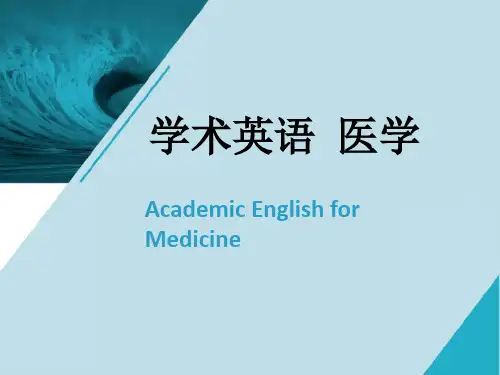

本篇包括人卫第四版Unit 3B,Unit4A,5A,8A,10A,12AB,13A等七篇课文Unit 3 Text B The Other Side of Antibiotics抗生素的另一面Antibiotics have eliminated or controlled so many infectious diseases that virtually everyone has benefited from their use at one time or another. Even without such personal experience, however, one would have to be isolated indeed to be unaware of the virtues, real and speculative, of these “miracle” drugs1. The American press, radio, and television have done a good job of reporting the truly remarkable story of successes in the chemical war on germs. What′s more, any shortcomings on their part have been more than made up for by the aggressive public relations activity of the pharmaceutical companies which manufacture and sell antibiotics.抗生素可以消除或控制很多种感染疾病,以致几乎每人生病时都习惯于使用它而受益,但是如果一个人没有这样的亲身经历,他必定是离群索居才会不知道这些“特效药物”或真实或推测的优点。
本篇包括人卫第四版Unit 3B,Unit4A,5A,8A,10A,12AB,13A等七篇课文Unit 3 Text B The Other Side of Antibiotics抗生素的另一面Antibiotics have eliminated or controlled so many infectious diseases that virtually everyone has benefited from their use at one time or another. Even without such personal experience, however, one would have to be isolated indeed to be unaware of the virtues, real and speculative, of these “miracle” drugs1. The American press, radio, and television have done a good job of reporting the truly remarkable story of successes in the chemical war on germs. What′s more, any shortcomings on their part have been more than made up for by the aggressive public relations activity of the pharmaceutical companies which manufacture and sell antibiotics.抗生素可以消除或控制很多种感染疾病,以致几乎每人生病时都习惯于使用它而受益,但是如果一个人没有这样的亲身经历,他必定是离群索居才会不知道这些“特效药物”或真实或推测的优点。
学术英语医学 Academic English for MedicineUnit 8 Principles of Biomedical EthicsDoctors and biomedical researchers make tough decisions that have to be morally justifiableevery day. Biomedical ethics provides moral principles and behavioral guidelines for the biomedical research and practice of medicine. It encompasses philosophy , sociology, theology, and practical applications in clinical settings. Text AUseful expressionsThe distinction between research andpractice is blurred partly because andpartly because notable departures frombe treated as autonomous agentspersons with diminished autonomy areentitled to protectionA provides an instructive exampleprisoners not be deprived of the opportunityto volunteer for researchfor which they would not otherwise volunteer Justas the principle of respect for persons findsexpression in the requirements forconsent, and the principle of beneficence in risk/benefit assessment, the principle ofjustice gives rise to moral requirements that there be fair procedures and outcomes in theselection of research subjects.Difficult sentencesAlmost all commentators allow thatdistinctions based on experience, age,deprivation, competence, merit and positiondo sometimes constitute criteria justifyingdifferential treatment for certain purposes. 几乎全部的议论员认可,出于特定目的,进行差别化对待的标准能够包含有无经验、年纪大小、能否贫穷、有无能力、功过大小和地位高低等要素的差别。
Text A What Analytical Chemists DoAnalytical chemistry is concerned with the chemical characterization of matter and the answers to two important questions: what is it (qualitative) and how much is it (quantitative). Chemicals make up everything we use or consume, and knowledge of the chemical composition of many substances important in our daily lives. Analytical chemistry plays an important role in nearly all aspects of chemistry, for example, agricultural, clinical, environmental, forensic, manufacturing, metallurgical, and pharmaceutical chemistry. The nitrogen content of a fertilizer determines its value. Foods must be analyzed for contaminants (e.g., pesticide residues) and for essential nutrients (e.g. vitamin content). The air in cities must be analyzed for carbon monoxide. Blood glucose must be monitored in diabetics (and, in fact, most diseases are diagnosed by chemical analysis). The presence of trace elements from gun powder on a murder defendant’s hand will prove a gun was fired. The quality of manufactured products often depends on proper chemical proportions, and measurement of the constituents is a necessary part of quality control. The carbon of steel will determine its quality. The purity of drugs will determine their efficacy.1、qualitative ['kwɔlitətiv, -tei-] adj.定性的;质的,性质上的2、quantitative ['kwɔntitətiv, -tei-] adj. 定量的;量的,数量的3、consume [kən'sju:m]vt.消耗,消费;使…著迷;挥霍vi. 耗尽,毁灭;耗尽生命4、analytical [,ænə'litik,-kəl] adj.分析的;解析的;善于分析的5、forensic[fɔ'rensik] adj.辩论的;法院的;适于法庭的6、metallurgical [,melə'lə:dʒik,-kəl] adj.冶金学的;冶金的7、nitrogen ['naitrədʒən] n. [化]氮8、contaminant [kən'tæminənt] n.污染物;致污物9、pesticide residues ['pestisaid] ['rezɪ,du:, -,dju:]杀虫剂残留10、carbon monoxide [无化] 一氧化碳11、glucose ['ɡlu:kəus]n.葡萄糖;葡糖(等于dextrose)12、diabetic [,daiə'betik] adj.糖尿病的,患糖尿病的n.糖尿病患者13、defendant [di'fendənt] adj.为自己辩护的;辩护的n.被告14、constituent [kən'stitjuənt]n.成分;选民;委托adj.构成的;选举的分析化学研究物质的化学成分,并且要解决两个问题:样品里有什么化学物质(定性),化学物质的量有多少(定量)。
在我们的日常生活中,化学物质无处不在,因而了解各种物质的化学成分非常重要。
分析化学对于化学的各个领域的应用,例如化学在农业、临床医学、法医学、制造业、冶金和药学领域的用,都非常重要。
化肥的氮含量决定其效价。
对于食品,要检查其是否被污染(例如农残),并测定其中必需营养物质(例如维生素)的含量。
而一氧化碳含量是城市空气质量的重要指标。
对于糖尿病患者(事实上许多疾病的诊断要依靠化验)监测血糖含量非常重要。
如果通过分析化验发现谋杀嫌犯手上有火药残留的痕迹,则可以证明他(她)开过枪。
产品质量的好坏往往其中各种化学成分的比例是否适当密切相关,因而测定产品中各种化学成分的比例是产品质控必不可少的一项工作。
钢铁的碳含量多少决定其质量的优劣。
药物的纯度影响其疗效。
What is Analytical Science?The above description of analytical chemistry provides an overview of the discipline of analytical chemistry. There have been various attempts to more specifically define the discipline. The late C harles N. Reilley said: “Analytical chemistry is what analytical chemists do.” The discipline has expanded beyond the bounds of just chemistry, and many have advocated using the name analytical science to describe the field. This term is used in a National Science Foundation report from workshops on “Curricular Developments in the Analytical Science.” Even this term falls short of recognition of the role of instrumentation development and application. One suggestion is that we use the term analytical science and technology.1、advocate ['ædvəkeit, 'ædvəkət]vt.提倡,主张,拥护n.提倡者;支持者;律师2、curricular [kə'rikjulə] adj.课程的3、short of缺乏;不足;除…以外4、recognition [,rekəg'niʃən] n.承认,认出;赞誉;重视;识别;公认5、instrumentation [,instrumen'teiʃən, ,instrə-] n. 乐器法;使用仪器;仪表化通过上面的描述,我们对分析化学这个学科有了大概的了解。
许多人试图对分析化学更为具体的定义。
已故的著名学者Charles N. Reilley说:分析化学就是分析化学家从事的工作。
这个学科的发展已经超出了化学的范畴,因此许多人建议用分析科学来描述这一领域。
在一个关于“分析科学的课程建设”的专题研讨会上有一篇关于自然科学基金报告上使用过这个术语。
但是,即便是采用这个术语也不足以体现新仪器的应用对分析化学的重要意义,因此有人建议使用“分析科学和技术”这个术语。
The Federation of European chemical societies held a contest to define analytical chemistry, and the following suggestion by K. Cammann was selected.Analytical chemistry provides the methods and tools needed for insight into our material world … for answering four basic questions about a material sample: What?Where?How much?What arrangement, structure or form?1、federation ['fedəreiʃən] n.联盟;联邦;联合;联邦政府欧洲化学学会联合会对分析化学的定义有不同的看法,该学会的K. Cammann对分析化学的定义如下:分析化学为我们深入的了解物质世界提供了方法和工具。
分析化学要解决以下四个基本问题:样品里有那些化学物质?这些物质如何分布?它们的含量是多少?这些物质是怎么排列的,组成什么样的结构?The Division of Analytical Chemistry of the American Chemical Societyprovides a comprehensive definition of analytical chemistry, which may be found on their website. It is reproduced in most part here:Analytical chemistry seek ever improved means of measuring the chemical composition of nature an artificial materials. The techniques of this science are used to identify the substances which may be present in a material and to determine the exact amounts of the identified substance.1、reproduce [,ri:prə'dju:s] vt.复制;再生;生殖;使…在脑海中重现vi.繁殖;复制美国化学会分析化学分会对于分析化学给出了一个全面的定义,我们可以在其网站上找到这个定义。